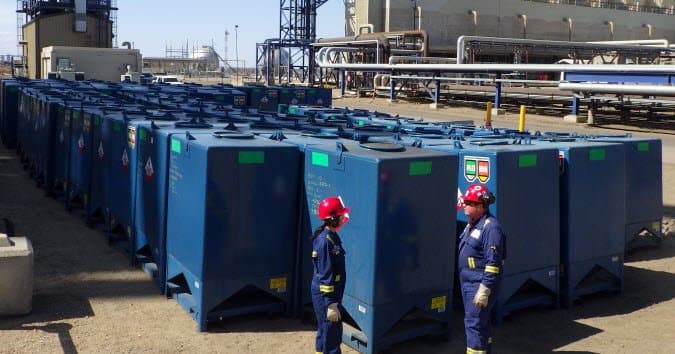For residents in the Edmonton and Strathcona County communities, minimizing waste has become a way of life as we reduce, reuse and recycle to avoid sending materials to landfills.
At Chilwell’s Edmonton refinery, waste reduction and recycling are also a key part of how we operate.
As a large facility with a crude oil capacity of 142,000 barrels per day, the refinery considers waste management when planning any project or job. Anyone creating waste as part of their work also needs to follow the refinery waste procedures for the proper disposal of materials.
In 2018, the Edmonton refinery recycled 3081.8 tonnes of material,” said Kate MacKenzie, environment, health and safety manager. “The refinery reprocesses materials that do not meet required specifications, and routinely recycles items such as batteries, cardboard, scrap steel, tires, metal drums, filters, plastic pails, paper, fluorescent bulbs, and computer parts/boards.
Repurposing, regenerating and reclaiming material is also a priority at the refinery. For example, catalysts are used in the refining process and over time, they degrade and need to be replaced. The metal components from some of the catalysts are of significant value and can be reclaimed. In early 2019, 97 bins were transported to a catalyst regeneration facility in southern Alberta. Material of suitable quality will be regenerated for reuse, and what remains will either be disposed of or reclaimed at an approved facility.
Another big ‘R’ is reducing. The refinery uses fresh water for heating and cooling. While the refinery’s water use over time has remained relatively flat, we are always looking for ways to limit the amount of water we use, including the amount of fresh water withdrawn from the North Saskatchewan River. In 2006, we worked with the municipal Gold Bar Wastewater Treatment Plant to increase the use of recycled wastewater at the refinery, which has resulted in more efficient water use over the years. In 2018 approximately 42 per cent of the total water withdrawn was recycled wastewater supplied from the Gold Bar Wastewater Treatment Plant.
Our team works hard to minimize resource use and reduce the refinery’s environmental footprint,” concludes Kate. “We focus on reducing, reusing, recycling, and reclaiming – all part of our environmental management strategy at the refinery.

